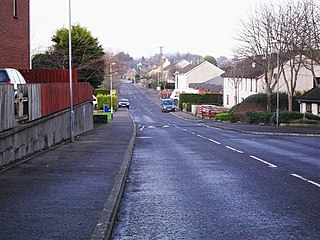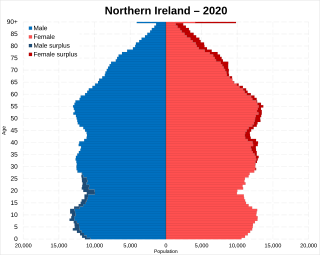This article needs additional citations for verification .(November 2024) |
The following is a list of A roads in Northern Ireland . As of 2023, A roads made up 8.9% of all roads in Northern Ireland. [1]
| Road | From | To | Notes |
|---|---|---|---|
| | Belfast | Killeen | Via Lisburn and Newry. Forming part of the main route from Belfast to Dublin. Becoming the N1 at the border, joining onto the Southern Irish M1 before Dundalk. |
| | Derry | Newry | Northern Irish coastal road. Including routes such as Belfast-Bangor, Belfast-Carrickfergus, Newry-Warrenpoint and Derry-Limavady |
| | Lisburn | Cavan | Via Craigavon and Armagh. Becomes the N12 at Middletown until Monaghan, then the N54 to Cavan via southern Fermanagh. |
| | Craigavon (Portadown) | Belcoo | Via Dungannon and Enniskillen. Becomes the N16 at the border towards Sligo. |
| | Derry | Aughnacloy | Via Strabane and Omagh. Becomes the N2 after the Aughnacloy at the border towards Dublin. |
| | Derry | Belfast | Via Dungiven, Antrim and Glengormley. |
| | Carryduff | Downpatrick | Via Saintfield. Stemming off the A24, it forms most of the main road from Belfast to Downpatrick. |
| | Glengormley | Larne | Via Ballynure. Stemming from the A6. |
| Unused | |||
| | Belfast Inner Ring Road | ||
| | Belfast (Broadway) | Belfast (York Street) | Westlink dual-carriageway in Belfast |
| Unused | |||
| | Belfast (Bridge End) | Portaferry | Via Dundonald and Newtownards |
| | Bangor | Ballynahinch | Via Newtownards and Comber and Ballygowan |
| | Dundonald | Downpatrick | Via Comber, Killinchy and Killyleagh. |
| | Belfast | Ballygowan | Via Moneyreagh. |
| | Belfast (Cromac Street) | Clough | Via Carryduff and Ballynahinch. Forms the greater part of the route from Belfast to Newcastle, and Kilkeel. |
| | Strangford | Altnamackan | Via Downpatrick, Clogh, Rathfriland, Newry and Newtownhamilton. Becomes the R182 at the border and carries on towards Castleblaney. |
| | Coleraine | Banbridge | Via Coleraine, Ballymena, Antrim, Moira, Craigavon (Lurgan) and Warringstown. |
| | Newry | Craigavon (Portadown) | |
| | Newry (Sheepsbridge) | Aughnacloy | Via Markethill, Armagh and Caledon. |
| | Portrush | Ballymaclosha | Via Maghera, Cookstown, Dungannon, Armagh, Keady and Newtownhamilton. At the border it becomes the R177 and carries on towards Dundalk. |
| | Lisburn | Glenavy | |
| | Moneymore | Castledawson | Form part of the route connecting Cookstown to Belfast. |
| | Omagh | Swanlinbar | Via Enniskillen. Becomes the N87 at the border. |
| | Newtownbutler | Republic of Ireland border west of Clones | Became a portion of a rerouted A34 by the 1970s. |
| | Maguiresbridge | Clones | Via Lisnaskea and Newtownbutler. Becomes the R183 road at the border |
| | Irvinestown | Pettigo | Via Kesh. Becomes the R234 at the border. |
| | Ballykeel | Ballyrickard | Via Moorfields and Killwaughter. Forms the main route from Larne to Ballymena. |
| ( Co. Londonderry ) | Macosquin | Limavady | Part of the Coleraine to Derry route.(North) |
| ( Co. Armagh ) | Dundalk | Castleblayney | Only a short stretch of this route actually lies within Northern Ireland. The rest of the route being called the N53.(South) |
| | Strabane | Lifford | Less than a mile lies in Northern Ireland crossing the River Foyle and divides into the N14 to Letterkenny and N15 to Sligo. |
| | Maguiresbridge | Lisnaskea | Became a portion of a rerouted A34. |
| | Derry city centre | Carrigans | West of the River Foyle, becomes the R236 at the border which carries on towards Raphoe. |
| Unused | |||
| | Maghera | Carnlough | Via Portglenone, Ahoghill, Galgorm, Ballymena and Broughshane. |
| | Ballymena | Glenarriff | Via Martinstown. |
| | Ballycastle | A26 north of Cloughmills | Via Armoy. |
| | Granville | Tamnamore | Via Dungannon and Coalisland |
| | Enniskillen | Belleek | Becomes the N3 at the border which carries on towards Ballyshannon. |
| | Enniskillen (Trory) | Belleek | Via Killadeas, Lisnarick, Kesh, Boa Island and Leggs. |
| | Newtownards | Donaghadee | Via Six Road Ends. |
| | Lisburn | Ballynahinch | |
| | Craigavon (Portadown) | Newcastle | Via Gilford, Banbridge, Katesbridge and Castlewellan. |
| | Gilford | Armagh | Via Tandragee and Hamiltonsbawn. |
| | Belfast (Carlisle Circus) | Crumlin | Via Nutt's Corner. |
| | Cookstown | Orritor | Declassified. |
| | Castledawson | Coleraine | Via Bellaghy and Kilrea. |
| | Belfast Outer Ring Road | ||
| Unused | |||
| | Belfast International Airport | Ballynure | Via Templepatrick and Ballyclare. Forms part of the main route connecting the airport with Belfast City and Larne. |
| Unused | |||
| | High Street, Belfast | York Road station, Belfast | via Corporation Street; now part of the A2 one-way system. It is unknown why the A68 number was chosen; an A5xx number (which were allocated to Belfast until the A505), the A56 (was and still is the lowest available number) or an A1x number (later allocated to central Belfast roads) would have been more logical. |
| Unused | |||
| | M1 | Craigavon (Lurgan) | |
| Unused | |||
| | Number appears on 1940s maps; typo for the A37 running through Cullaville. | ||
| Unused | |||
| | A3 Edward Street, Lurgan | A26/B3 in Lurgan | Millennium Way; one sign showed "A3", but this is incorrect. |
| | M1 | Sprucefield, near Lisburn | |
| | Bridge Street and Newtownards Road in Comber, designated when the A21 Comber Bypass was opened in 2004 | ||
| | Bridge Street and Newtownards Road in Comber, designated when the A21 Comber Bypass was opened in 2004. Officially known as A211, but signed as A221. | ||
| | Various roads in Limavady town centre, designated when the A37 Limavady Bypass was opened in 2004 | ||
| | Donegall Street, Belfast | Whitla Street, Belfast | The northern section is now part of a rerouted A2 and the southern half unclassified. |
| | Belfast | A30 just east of Glenavy | |
| Unused | |||
| | Donegall Square, Belfast | Shaftesbury Square, Belfast | via Howard Street and Great Victoria Street; former portions of the B38 and B23. Later became part of the A1 one-way system and is now part of the A1 and A11. |
| | Dundonald | Newtownbreda | Formerly a section of the B205 before it was upgraded as part of work to give Belfast an outer ring road. Now part of the A55. |
| | Omagh | Cookstown | Via Mountfield. |
| Unused | |||
| | Antrim | Rathbeg | via Belmont Road, Ballycraigy Road and Greystone Road (former B95); the section along Belmont Road is now part of a rerouted A6 and the remainder downgraded to Class II status: Ballycraigy Road is now the B518 and Greystone Road returned to the B95. |
| | Enniskillen | Belturbet | Becomes the N3 at the border after Derrylin. |
| | Belfast (Cromac Street) | Ballymacarrett (Albertbridge Road) | Formerly numbered as A20. |
| Unused | |||
| | Old Golf Course link road in West Belfast and North Lisburn | ||
| | Ballymacash | Derriaghy | Lisburn Feeder Road |
| | Derry Ring Road (Crescent Link) | ||
| | Derry Ring Road (Foyle Bridge and Skeoge Link Road) | ||
| Unused | |||
| | Tonagh | Ballymacash | Distributor road in western Lisburn |
| | Ballymacash | Knockmore | Link between the A3 and the A519 in Western Lisburn |
| Unused | |||
| | Dublin Road, Antrim | Belmont Road, Antrim | Former route of the A6 through Antrim town centre. |
| | Ballymena Town Centre | Ballee Roundabout, Ballymena | Former route of the A26 through Ballymena. |

















